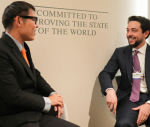You are here
At the root of injustice against women
Nov 25,2017 - Last updated at Nov 25,2017
Aformer deputy raises his voice at women lawyers and waves off a Jordanian mother telling her to take her son back to Egypt where they can take care of him as their own.
A senior civil servant asks why would the government treat a woman as equal under the law if religion did not make women equal to men. A Sharia marriage registrar (ma’thoun shar’ee) rejects a young bride’s request to add conditions to her marriage contract, as sanctioned by the Personal Status Law, and threatens to scuttle her wedding if she does not stay mum.
A young man interviewed for a television programme giggles as he tells the interviewer that he would shoot to kill his sister to preserve his family’s honour if she insisted on working outside the home against his wishes.
These incidents are not isolated, nor are they one-offs. They are clear indications of the increased and quite vocal frustration with and disdain for Jordanian women’s demands for equal rights.
And we really should not have expected better treatment when Jordanian women languish under reduced citizenship conditions pending a government decision to upgrade their collective rights to match their package of legal and financial obligations to the state.
As long as the government refuses to amend Article 6 of the Constitution to guarantee equal rights to all its citizens, regardless of their sex, women of this country will continue to be treated with disrespect and derision by “those who matter and those who do not”, to quote from a well-known Arabic saying.
The audacity of the arguments and the disrespect when referencing Jordanian women have become normalised not because of an ingrained “backwardness” and “ignorant mindset” of Jordanians, as some would have us believe, but because of the constitutional omission and the tens of laws that were created based on its logic and which treat women as reduced citizens with severely diminished fitness and mental ability.
The former deputy, the senior civil servant, the marriage registrar and the young man — as well as all the men they represent and the women who publicly support them in fear of their wrath — as individuals are not necessarily important, nor do they represent a unique or an unexplained anomaly in Jordan.
They are all a manifestation of a system that we created and protected when we accepted to have a constitutional provision that frames women as lesser citizens.
They are also the products of the legal system that consolidated and institutionalised the advantage of men by virtue of their sex, an education system that reinforced this perception of natural hierarchy by framing women and men within traditional roles, a by-product of the political contract that bartered the rights of the women of the country for political support and, of course, underlying all these factors and feeding into them is the fear that most men appear to have that they will lose economic and social privilege if they make space for women as partners and equals by their side.
At this point we can no longer deal with these situations on a case-by-case basis or as individuals. The effort can not be fragmented, nor can it continue at the pace it had been following so far.
Women activists have worked diligently, quietly and slowly to extract small concessions in the hope that these, collectively, would produce a change in mindsets towards women’s rights and, with it, a changed legal framework, without aggressively upsetting the social order.
While this has worked in some critical areas, especially in access to education and health services, as well as improving the status of female public sector employees, it is clear that women can not be left to be solely responsible for creating the change required to elevate their status to where it should be as citizens, nor can they achieve that objective if there is such a huge structural impediment as a constitutional provision.
It is clear that the government has to step in now, feet first and with the courage it should showcase when protecting its citizens, and amend Article 6 of the Constitution to declare once and for all that in Jordan, Jordanian women and men are equal and will be treated as such by the state.
There is no other step that would adequately show political will and send a clear message that in our country misogyny and exclusion will no longer be tolerated.
Yesterday was the first of 16 days of a global campaign of activism to end violence against women, a theme that is commemorated the world over every year.
The theme this year is “leave no one behind”. In Jordan, women are relegated to the back rows of society, trailing behind men, forgotten and uncared for because of archaic misconceptions and a huge misreading of tradition and religion.
It is time for the government to address the injustice at its roots: Article 6 of the Constitution.













